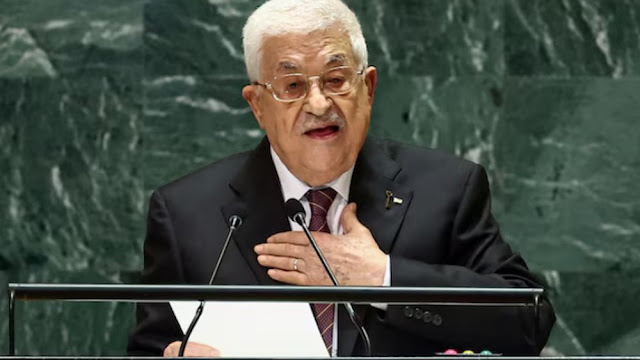Ramallah, Occupied Palestinian Territory – In a strongly worded statement issued on August 29, 2025, the Palestinian Authority (PA) and the Palestine Liberation Organization (PLO) denounced the United States’ decision to deny and revoke visas for their representatives ahead of the United Nations General Assembly (UNGA) in New York. The move, described as a “flagrant breach” of the 1947 UN Headquarters Agreement, has sparked outrage among Palestinian leadership, who view it as an attempt to stifle their diplomatic efforts and undermine their observer status at the UN. The decision comes at a critical juncture, as the international community grapples with the escalating crisis in Gaza and growing calls for recognition of the State of Palestine.
Ahmed al-Deek, a political adviser to the Palestinian foreign minister, expressed “deep astonishment” at the U.S. decision, arguing that it violates the 1947 Headquarters Agreement, which mandates that the U.S., as the host nation of the UN headquarters, ensure the entry and protection of representatives from UN member states and observer entities. The PA has called on UN Secretary-General Antonio Guterres and member states to address this violation and has vowed to consult with friendly nations to determine appropriate diplomatic responses. The Palestinian Presidency echoed these sentiments, expressing “deep regret and surprise” and urging the U.S. to reverse its decision.
Palestinian President Mahmoud Abbas addresses the 79th United Nations General Assembly at United Nations headquarters in New York, the United States, on September 26, 2024. (Photo by Reuters)
The visa cancellations, announced by the U.S. State Department on Friday, are seen as a response to the PA’s appeals to international judicial bodies, including the International Criminal Court (ICC) and the International Court of Justice (ICJ), to address alleged Israeli war crimes in the occupied West Bank and Gaza. The move has reignited debates about the U.S.’s role as a neutral host for the UN and its broader stance on the Israeli-Palestinian conflict. As the UNGA approaches, the controversy threatens to further polarize international efforts to resolve the crisis in Palestine.
The U.S. Decision: Context and Rationale
The U.S. State Department’s announcement on August 29, 2025, confirmed the cancellation and revocation of visas for members of the PLO and PA, effectively barring them from attending the UNGA. The decision was justified by the U.S. as a response to what it described as the PA’s “attempts to bypass negotiations” through its engagement with international judicial bodies. Specifically, the U.S. pointed to the PA’s appeals to the ICC to investigate Israeli actions in the occupied territories and its support for an ICJ advisory opinion on the legality of Israel’s occupation.
The U.S. has long maintained that direct negotiations between Israel and the Palestinians are the only path to resolving the conflict, a stance that critics argue ignores the power imbalance between the two parties and Israel’s ongoing violations of international law. The visa cancellations are seen as an extension of this policy, aimed at pressuring the PA to abandon its pursuit of international accountability for Israel’s actions. The move also aligns with the U.S.’s broader support for Israel, particularly in the context of the ongoing war in Gaza, which has resulted in unprecedented levels of destruction and loss of life.
Since October 7, 2023, Israel’s military campaign in Gaza has killed at least 63,025 Palestinians and injured 159,490, according to Gaza’s health ministry. The campaign, launched in response to a Hamas-led attack that killed over 1,200 Israelis, has been described by human rights organizations as genocidal, prompting the PA to seek justice through international mechanisms. The U.S.’s decision to target Palestinian representatives at this critical moment has been criticized as an attempt to silence their advocacy and limit their ability to engage with the international community.
The 1947 UN Headquarters Agreement: A Legal Framework
The 1947 UN Headquarters Agreement, signed between the United Nations and the United States, is a cornerstone of the controversy surrounding the visa cancellations. The agreement stipulates that the U.S., as the host nation of the UN headquarters in New York, must facilitate the entry of representatives, staff, and experts from UN member states and observer entities, regardless of the state of diplomatic relations between the U.S. and those entities. This obligation is designed to ensure that the UN can function as a neutral platform for international diplomacy, free from interference by the host nation.
Ahmed al-Deek, in his statement, argued that the U.S. decision constitutes a “flagrant breach” of this agreement, as it directly impedes the ability of Palestinian representatives to participate in UNGA proceedings. Palestine, recognized as a non-member observer state by the UN General Assembly in 2012, is entitled to the protections afforded by the Headquarters Agreement. The PA’s observer status grants it the right to participate in UN meetings, submit resolutions, and engage in diplomatic activities, making the visa cancellations a significant obstacle to its international advocacy.
The Palestinian Presidency reinforced this point, stating that the U.S. move “stands in clear contradiction to international law and the UN Headquarters Agreement.” The statement called on the U.S. to reconsider its decision, emphasizing that the visa cancellations undermine the principles of multilateralism and the UN’s role as a forum for dialogue. The PA’s appeal to UN Secretary-General Antonio Guterres and member states reflects a broader effort to hold the U.S. accountable for what it sees as a violation of its international obligations.
Palestinian Response: Diplomatic and Strategic Considerations
The PA’s response to the U.S. decision has been multifaceted, combining public condemnation with diplomatic outreach to friendly nations. Ahmed al-Deek’s call for UN intervention underscores the PA’s strategy of leveraging international institutions to counter U.S. pressure. By framing the visa cancellations as a violation of the Headquarters Agreement, the PA seeks to rally support from UN member states, particularly those that have recognized the State of Palestine or expressed solidarity with the Palestinian cause.
The PA has vowed to consult with “friendly nations” to determine appropriate diplomatic steps, signaling its intent to pursue a coordinated response. Countries such as France, the United Kingdom, Ireland, Spain, Norway, and Slovenia, which have either recognized Palestine or expressed intentions to do so, are likely to be key allies in this effort. The growing wave of recognition for the State of Palestine, with 149 countries acknowledging its sovereignty as of August 2025, provides the PA with a strong diplomatic foundation to challenge the U.S. decision.
The Palestinian Presidency’s statement also emphasized that the U.S. move “will not stop the wave of recognition of the State of Palestine, nor the international consensus on the need to halt genocide, displacement, and annexation.” This assertion reflects the PA’s determination to continue its diplomatic campaign, despite the obstacles posed by the U.S. The PA’s engagement with the ICC and ICJ, which the U.S. cited as a reason for the visa cancellations, is a central component of this strategy, aimed at holding Israel accountable for alleged war crimes and advancing the Palestinian cause on the global stage.
The Broader Context: The Gaza War and International Recognition
The visa cancellations come against the backdrop of Israel’s ongoing war in Gaza, which has drawn unprecedented international attention to the Palestinian struggle. Since October 7, 2023, the conflict has resulted in catastrophic loss of life and destruction, with Gaza’s infrastructure decimated and its population facing severe humanitarian challenges. The UN Relief and Works Agency for Palestine Refugees (UNRWA) has warned that Israel’s recent push to occupy Gaza City could displace up to one million people, further exacerbating the crisis.
The PA’s appeals to the ICC and ICJ are part of a broader effort to seek justice for Palestinians affected by the war and Israel’s policies in the occupied West Bank. The ICC has been investigating alleged war crimes in the occupied territories since 2021, while the ICJ is considering a case on the legality of Israel’s occupation, prompted by a 2022 UNGA resolution. These legal efforts have been met with resistance from Israel and its allies, particularly the U.S., which has accused the PA of bypassing negotiations by pursuing international accountability.
At the same time, the international community’s stance on Palestine has been shifting. The recognition of the State of Palestine by countries like France and the United Kingdom, announced ahead of the UNGA, reflects growing support for Palestinian statehood. This trend has been driven by frustration with Israel’s actions in Gaza and the occupied West Bank, as well as a broader push for a two-state solution based on pre-1967 borders. The U.S.’s visa cancellations are seen by some analysts as an attempt to counteract this momentum, signaling its opposition to unilateral actions by the PA.
International Reactions and Implications
The U.S. decision has drawn varied reactions from the international community. UN Secretary-General Antonio Guterres, to whom the PA directed its appeal, has not yet publicly responded, but the UN is likely to face pressure to address the issue. Member states that support Palestine, including those in the Non-Aligned Movement and the Arab League, are expected to raise the visa cancellations at the UNGA, framing them as a violation of the UN’s principles of inclusivity and neutrality.
Countries that have recognized Palestine or expressed solidarity with its cause have condemned the U.S. move. France, which recently announced its intention to recognize Palestine, called the decision “regrettable” and urged the U.S. to uphold its obligations under the Headquarters Agreement. The United Kingdom, another key ally of the U.S., expressed concern about the implications for Palestinian representation at the UN, emphasizing the need for dialogue to resolve the conflict.
The U.S.’s actions have also reignited debates about its role as the host nation of the UN headquarters. Critics argue that the U.S. has a history of using its visa authority to influence UN proceedings, citing past instances where representatives from countries like Iran and Cuba faced similar restrictions. The visa cancellations for PLO and PA members are seen as part of this pattern, raising questions about the U.S.’s commitment to multilateralism and the UN’s autonomy.
The controversy has broader implications for the Israeli-Palestinian conflict and the prospects for a negotiated resolution. The U.S.’s unwavering support for Israel, coupled with its pressure on the PA, risks further alienating Palestinians and undermining trust in American mediation efforts. The PA’s pursuit of international recognition and accountability, while a strategic response to these challenges, could deepen the divide between the parties, making a two-state solution more elusive.
Challenges and Opportunities for the PA
The visa cancellations pose significant challenges for the PA’s diplomatic efforts. The inability of PLO and PA representatives to attend the UNGA limits their ability to engage directly with world leaders, submit resolutions, and advocate for Palestinian rights. The UNGA, which convenes annually in September, is a critical platform for the PA to highlight the situation in Gaza and the occupied West Bank, mobilize international support, and push for recognition of Palestinian statehood. The U.S. decision threatens to marginalize the PA at this crucial moment, potentially weakening its influence on the global stage.
However, the controversy also presents opportunities for the PA to galvanize international support. By framing the visa cancellations as a violation of international law, the PA can rally UN member states to pressure the U.S. to reverse its decision. The growing number of countries recognizing Palestine provides a strong diplomatic base to build on, while the PA’s engagement with the ICC and ICJ ensures that the issue of Israeli violations remains in the global spotlight.
The PA’s call for consultation with friendly nations suggests a proactive approach to countering the U.S. move. Potential strategies include filing a formal complaint with the UN, seeking a resolution condemning the visa cancellations, or pursuing legal action through international courts. The PA could also leverage its observer status to mobilize support within the UNGA, where it enjoys significant backing from the Global South.
The Role of the United Nations
The UN faces a delicate balancing act in responding to the visa cancellations. As the guardian of the Headquarters Agreement, the UN has a responsibility to ensure that all member states and observer entities can participate in its proceedings. The PA’s appeal to Secretary-General Guterres places the UN in a challenging position, as it must navigate its relationship with the U.S., its most powerful member state, while upholding the principles of inclusivity and neutrality.
The UNGA, which includes 193 member states, provides a platform for the PA to raise the issue and seek support. A resolution condemning the U.S. decision could garner significant backing, particularly from countries in the Arab League, the Organization of Islamic Cooperation, and the Non-Aligned Movement. However, the U.S.’s influence within the UN, particularly in the Security Council, could limit the effectiveness of such efforts.
The UN’s response will also depend on the broader context of the Israeli-Palestinian conflict. The ongoing war in Gaza, coupled with Israel’s policies in the occupied West Bank, has heightened international concern about the situation in Palestine. The UN’s ability to address the visa cancellations in a way that reinforces its commitment to multilateralism will be critical to maintaining its credibility as a global institution.
Looking Ahead: The Path Forward
The U.S. decision to deny and revoke visas for PLO and PA members represents a significant challenge to Palestinian diplomacy but also an opportunity to galvanize international support. The PA’s condemnation of the move as a violation of the 1947 Headquarters Agreement underscores its commitment to international law and its determination to advocate for Palestinian rights despite external pressures. The call for UN intervention and consultation with friendly nations signals a proactive approach to countering the U.S. decision and advancing the Palestinian cause.
As the UNGA approaches, the PA will need to navigate a complex diplomatic landscape, leveraging its observer status and international alliances to ensure its voice is heard. The growing wave of recognition for the State of Palestine, coupled with increasing scrutiny of Israel’s actions, provides a favorable environment for the PA to push its agenda. However, the U.S.’s influence and its alignment with Israel pose significant obstacles that will require strategic maneuvering.
The broader implications of the visa cancellations extend beyond the UNGA, affecting the prospects for a negotiated resolution to the Israeli-Palestinian conflict. The U.S.’s actions risk further eroding trust in its role as a mediator, while the PA’s pursuit of international accountability could deepen tensions with Israel. A sustainable resolution will require bold diplomacy, international cooperation, and a commitment to addressing the root causes of the conflict, including the occupation and the humanitarian crisis in Gaza.
Conclusion
The Palestinian Authority’s condemnation of the U.S. visa cancellations for PLO and PA members reflects the escalating tensions surrounding the Israeli-Palestinian conflict and the challenges of Palestinian diplomacy. By framing the decision as a violation of the 1947 UN Headquarters Agreement, the PA has positioned itself as a defender of international law, appealing to the UN and its member states for support. The move underscores the PA’s determination to continue its advocacy for Palestinian rights, despite efforts to marginalize its representatives.
The controversy highlights the broader dynamics of the conflict, including the U.S.’s unwavering support for Israel, the growing international recognition of Palestine, and the catastrophic situation in Gaza. As the UNGA approaches, the PA’s ability to mobilize support and navigate diplomatic challenges will be critical to advancing its cause. The visa cancellations, while a setback, have also galvanized the Palestinian leadership to pursue a more assertive and coordinated response, ensuring that the struggle for justice and statehood remains at the forefront of the global agenda.






